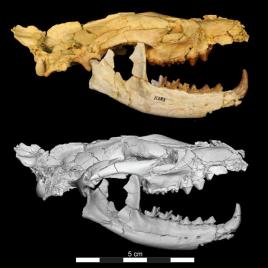
Common murre parents share information about their condition and compensate when one is struggling. (Image by L. Takahashi)
Common murre pairs (also known as the common guillemot, and found in abundance off the coast of Newfoundland) have an equal share in parenting duties: whether it’s brooding the chick in the nest or foraging for fish, parents take turns doing their part. A new study sheds light on the significance of the so-called nest relief process, where the birds preen each other after one parent’s return from foraging duty. According to the study, this time is used by the murres to check in with their mate: if the mate’s energy and body mass is running low, they stay on brooding duty for a longer period of time, since it’s a smaller energy investment than fishing. These findings are among the first to analyse how communication—not evolutionary tradeoffs—affect bird pair cooperation.
Authors:
Linda S. Takahashi, Anne E. Storey, Sabina I. Wilhelm, and Carolyn J. Walsh
Corresponding author:
Carolyn Walsh, Faculty of Science, Memorial University, NL, Email: cwalsh@play.psych.mun.ca
Original paper published in The Auk: Ornithological Advances on April 26, 2017.


